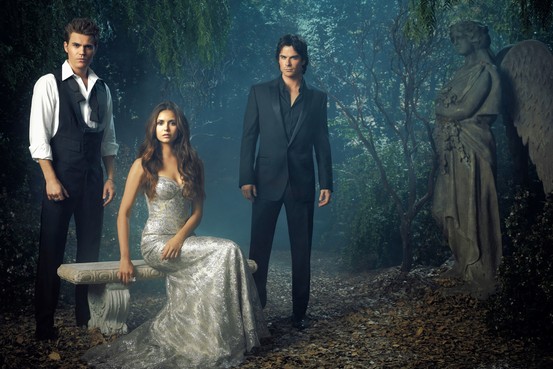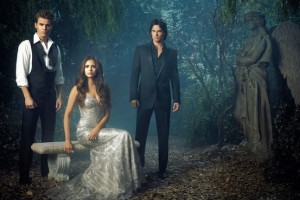You want to know why I love writing the Fox & O’Hare books with Janet Evanovich? This blog post, which I first ran here ten years ago, explains why. While some of the TV references in the post are dated, nothing has really changed in the television or even literary landscape in the years since I wrote this. Which may be why readers have embraced The Heist and The Chase so enthusiastically, making them both top New York Times bestsellers.
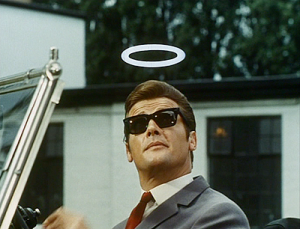 There’s nobody cool on television any more.
There’s nobody cool on television any more.
Not so long ago, the airwaves were cluttered with suave spies, slick private eyes, and debonair detectives. Television was an escapist medium, where you could forget your troubles and lose yourself in the exotic, sexy, exciting world inhabited by great looking, smooth-talking, extraordinarily self-confident crimesolvers.
You didn’t just watch them. You wanted to be them.
When I was a kid, I pretended I had a blow-torch in my shoe like James T. West. That I could pick a safe like Alexander Mundy, seduce a woman like Napoleon Solo, and run 60 miles an hour like Steve Austin. I wanted to have the style of Peter Gunn, the brawn of Joe Mannix, the charm of Simon Templar, and the wealth of Amos Burke, who arrived at crime scenes in a chauffeur-driven Rolls Royce.
But around the time coaxial cable and satelite dishes made TV antennaes obsolete, television began to change. Suddenly, it wasn’t cool to be cool. It was cool to be troubled. Deeply troubled.
TV cops, crimesolvers, and secret agents were suddenly riddled with anxiety, self-doubt, and dark secrets. Or, as TV execs like to say, they became “fully developed” characters with “lots of levels.”
You can trace the change to the late 80s and early 90s, to the rise of “NYPD Blue,” “Twin Peaks,” “Miami Vice,” “Wiseguy,” and “The X Files” and the fall of “Magnum PI,” “Moonlighting,” “Simon & Simon,” “MacGyver,” and “Remington Steele.”
None of the cops or detectives on television take any pleasure in their work any more. They are all recovering alcoholics or ex-addicts or social outcasts struggling with divorces, estranged children, or tragic losses too numerous to catalog and too awful to endure.
FBI Agent Fox Mulder’s sister was abducted by aliens, his partner has some kind of brain cancer, and he’s being crushed by a conspiracy he can never defeat.
CSI Gil Grissum is a social outcast who works knee-deep in gore and bugs while struggling with a degenerative hearing disorder that could leave him deaf.
Det. Lennie Briscoe of “Law and Order” is an alcoholic whose daughter was murdered by drug dealers.
Det. Olivia Benson of “Law and Order: Special Victims Unit” is a product of a rape who now investigates the worst forms of sexual depravity and violence.
“Alias” spy Sydney Bristow’s loving boyfriend and caring roommate were brutally murdered because of her espionage work, she’s estranged from her parents, one of whom just might be a murderous traitor.
I’ve lost track of how many of Andy Sipowitz’s wives, children and partners have died on horrible deaths on “NYPD Blue,” but there have been lots.
 Master sleuth Adrian Monk solves murders while grappling with his obsessive-compulsive disorder and lingering grief over his wife’s unsolved murder. And Monk is a light-hearted comedy. When the funny detectives are this psychologically-troubled and emotionally-scarred, you can imagine how dark and haunted the serious detectives have to be not get laughs.
Master sleuth Adrian Monk solves murders while grappling with his obsessive-compulsive disorder and lingering grief over his wife’s unsolved murder. And Monk is a light-hearted comedy. When the funny detectives are this psychologically-troubled and emotionally-scarred, you can imagine how dark and haunted the serious detectives have to be not get laughs.
Today’s cops, detectives and crimesolvers work in a grim world full of sudden violence, betrayal, conspiracies and corruption. A world without banter, romance, style or fun…for either the characters or the viewer. Robert Goren, Bobby Donnell, Vic Mackey, Chief Jack Mannion… can you imagine any kids playing make-believe as one of those detective heroes? Who in their right mind would want to be those characters or live in their world?
And that, it seems, is what escapism on television is all about now: watching a TV show and realizing, with a sigh of relief, your life isn’t so bad after all.
I think I preferred losing myself in a Monte Carlo casino with Alexander Mundy or traveling in James T. West’s gadget-laden railroad car… it’s a lot more entertaining than feeling thankful I don’t have to be Det. Joel Stevens in “Boomtown” or live in the Baltimore depicted in “The Wire.”
At the risk of sounding like an old curmudgeon at my tender young age, I long for a return to escapist cop shows, to detectives you envied, who live in a world of great clothes, sleek cars, amazing apartments, beautiful women and clever quips. Detectives with lives that are blessedly free of angst and anxiety. Detectives who aren’t afraid to wear a tuxedo, sip fine champagne, confront danger with panache, and wear a watch that’s actually a missile-launcher. Detectives who are self-assured and enjoy solving crimes, who aren’t burdened with heartache and moral ambiquity.
Yeah, I know it’s not real. Yeah, I know it’s a fantasy. But isn’t that what television is supposed to be once in a while?



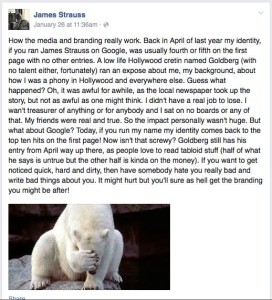
 There’s nobody cool on television any more.
There’s nobody cool on television any more. Master sleuth Adrian Monk solves murders while grappling with his obsessive-compulsive disorder and lingering grief over his wife’s unsolved murder. And Monk is a light-hearted comedy. When the funny detectives are this psychologically-troubled and emotionally-scarred, you can imagine how dark and haunted the serious detectives have to be not get laughs.
Master sleuth Adrian Monk solves murders while grappling with his obsessive-compulsive disorder and lingering grief over his wife’s unsolved murder. And Monk is a light-hearted comedy. When the funny detectives are this psychologically-troubled and emotionally-scarred, you can imagine how dark and haunted the serious detectives have to be not get laughs.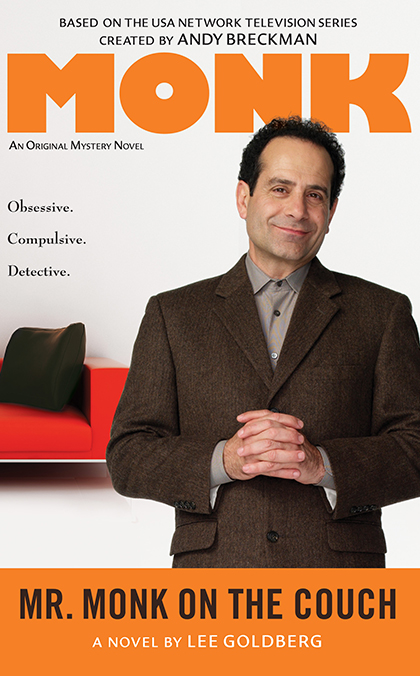
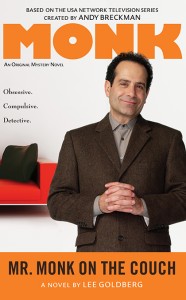 I get lots of questions and complaints about my Monk novels. Here are just a few recent ones.
I get lots of questions and complaints about my Monk novels. Here are just a few recent ones.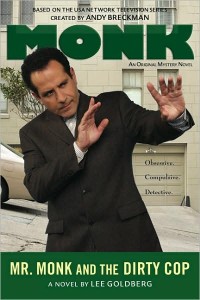
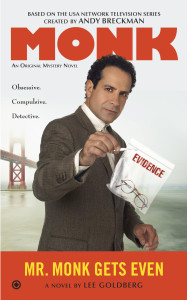


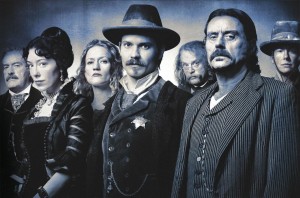

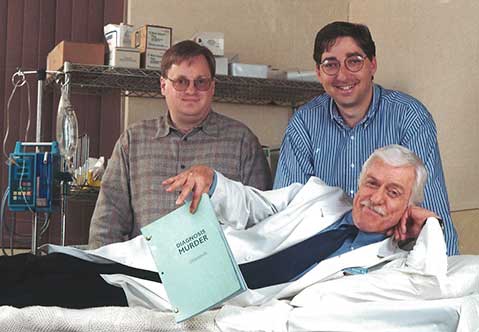 Lee was the executive producer and principle writer of the Diagnosis Murder series, which made our adventure into medical crime drama even more exciting. We knew the writer/producer personally. We don’t usually have that kind of connection to the shows we watch. So what’s Diagnosis Murder about?
Lee was the executive producer and principle writer of the Diagnosis Murder series, which made our adventure into medical crime drama even more exciting. We knew the writer/producer personally. We don’t usually have that kind of connection to the shows we watch. So what’s Diagnosis Murder about?  Watch the first few Diagnosis Murder episodes in a row and you’ll be hooked. It’s so popular there’s even a roaring trade in Diagnosis Murder fanfiction, some of it uncomfortably X-rated. There are literally hundreds of guest stars listed on the show’s Wikipedia page. And the stars of the show, including Dick Van Dyke, Barry Van Dyke, Victoria Rowell and Scott Baio of Happy Days fame, are developed beautifully throughout the series. The plots are satisfyingly twisty and turny, the science bits are fascinating and the stories don’t date. All the hallmarks of top quality crime fiction entertainment, and great fun.
Watch the first few Diagnosis Murder episodes in a row and you’ll be hooked. It’s so popular there’s even a roaring trade in Diagnosis Murder fanfiction, some of it uncomfortably X-rated. There are literally hundreds of guest stars listed on the show’s Wikipedia page. And the stars of the show, including Dick Van Dyke, Barry Van Dyke, Victoria Rowell and Scott Baio of Happy Days fame, are developed beautifully throughout the series. The plots are satisfyingly twisty and turny, the science bits are fascinating and the stories don’t date. All the hallmarks of top quality crime fiction entertainment, and great fun.

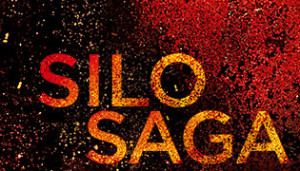 These same “experts” aren’t concerned when amateur writers nakedly rob authors of their intellectual property by writing and disseminating unauthorized fanfic based on characters and worlds the fanficcers didn’t create and don’t own. They are only concerned when the creators and rights holders have the audicity to exert their moral, artistic, and legal rights to “profit for fan fiction”:
These same “experts” aren’t concerned when amateur writers nakedly rob authors of their intellectual property by writing and disseminating unauthorized fanfic based on characters and worlds the fanficcers didn’t create and don’t own. They are only concerned when the creators and rights holders have the audicity to exert their moral, artistic, and legal rights to “profit for fan fiction”: I love how Ms. Tandy puts quotes around original as if its a lesser form of writing than stuff based on someone else’s work…and implies that it’s unfair for the creators of original work to want their legal, creative and moral rights protected…and that fanfic authors of quote unquote unoriginal work somehow deserve greater protections. She has it all ass-backwards. Fanfic writers aren’t “giving away” more rights in this scenario, they are being granted rights they didn’t already have… to use and profit from characters they didn’t create and don’t own.
I love how Ms. Tandy puts quotes around original as if its a lesser form of writing than stuff based on someone else’s work…and implies that it’s unfair for the creators of original work to want their legal, creative and moral rights protected…and that fanfic authors of quote unquote unoriginal work somehow deserve greater protections. She has it all ass-backwards. Fanfic writers aren’t “giving away” more rights in this scenario, they are being granted rights they didn’t already have… to use and profit from characters they didn’t create and don’t own.